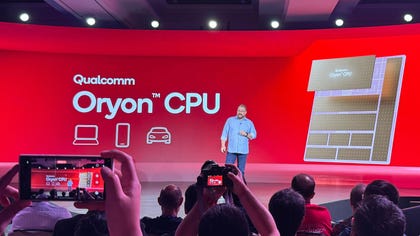Arm Cancels Qualcomm’s Chip Design License Amid Legal Battle
The tech world has been shaken by a recent development: Arm, a leading chip design company, has canceled a critical license agreement with Qualcomm. This move has far-reaching implications for the semiconductor industry and could significantly impact the future of mobile and automotive technologies.
The Fallout: A Legal Battle
The dispute between Arm and Qualcomm stems from Qualcomm’s acquisition of Nuvia, a chip design company. Arm alleges that Qualcomm has violated its licensing agreement by using Nuvia’s designs in its own chip products, specifically the Oryon CPUs. Qualcomm, on the other hand, maintains that its existing license covers the use of Nuvia’s designs.
This disagreement has escalated into a full-blown legal battle, with Arm issuing a 60-day notice to terminate the license agreement. This move could have serious consequences for Qualcomm, as it relies heavily on Arm’s architecture for its chip designs.
Impact on Qualcomm’s Chip Development
Qualcomm’s Oryon CPUs, which are based on Nuvia’s designs, are at the heart of the company’s latest mobile and automotive chips. These chips are designed to power the next generation of AI-powered devices, including smartphones, tablets, and cars.
If Qualcomm loses the legal battle or is forced to renegotiate the license agreement with Arm on less favorable terms, it could significantly impact the development and performance of its future products. This could lead to delays in product launches, increased costs, and potentially reduced competitiveness in the market.
The Broader Implications for the Semiconductor Industry
The Arm-Qualcomm dispute highlights the increasing importance of intellectual property rights in the semiconductor industry. Arm’s architecture is widely used by chip designers around the world, and any changes to its licensing terms could have far-reaching consequences.
If Qualcomm is forced to abandon Arm’s architecture, it may need to develop its own proprietary architecture or license technology from other companies. This could be a costly and time-consuming process, and it could also limit Qualcomm’s ability to compete with other chipmakers.
The Future of AI-Powered Devices
The development of AI-powered devices, such as smartphones and self-driving cars, relies heavily on advanced chip technologies. Qualcomm’s Oryon CPUs, which are designed to accelerate AI workloads, are a key component of this trend. However, the ongoing legal battle with Arm could potentially hinder Qualcomm’s ability to deliver cutting-edge AI solutions.
If Qualcomm is forced to redesign its chips or find alternative sources of technology, it could delay the development of AI-powered devices and slow down the pace of innovation in the tech industry. This could have significant implications for consumers, businesses, and society as a whole.
The Arm-Qualcomm dispute is a high-stakes legal battle that could reshape the landscape of the semiconductor industry. The outcome of the case will have far-reaching consequences for the development of advanced technologies, including AI, and could impact the future of mobile devices and autonomous vehicles.
As the trial unfolds, the tech world will be watching closely to see how this dispute plays out and what impact it will have on the future of chip design and innovation.


Comments are closed.